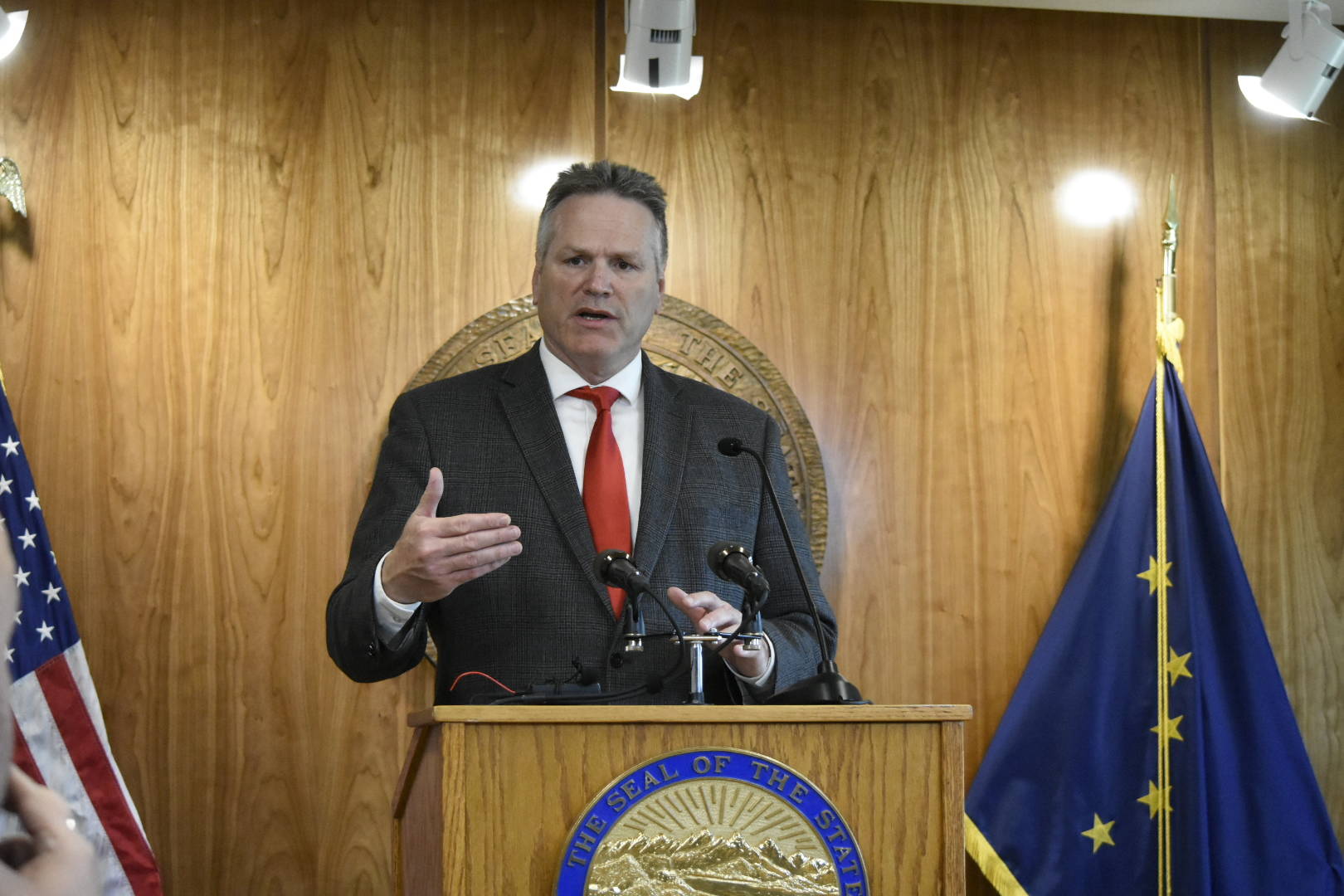This story has been updated to reflect new information and clarify the Dunleavy administration’s position.
Gov. Mike Dunleavy said he is ready to call lawmakers into another special session if they are unable to rectify issues within the budget bill passed earlier this week.
In a news conference at the Capitol Thursday, Dunleavy called the budget “defective” and urged lawmakers to return to negotiations and craft a less divisive budget before 11:59 p.m. on Friday.
“It’s my hope and the hope of Alaskans some of the brinksmanship can be put aside,” Dunleavy said. “We’re hoping that the Legislature can fix some of the problems.”
But without a budget, lay-off notices were sent to state employees Thursday, according to lawmakers and the state’s largest labor organization.
In a social media post, Sen. Jesse Kiehl, D-Juneau, called the pink slips, which he said were sent during the governor’s news conference, unnecessary in light of the previously passed budget.
“It’s the nastiest tantrum I’ve seen — and I work in politics,” Kiehl said in the post.
Budget negotiations collapsed earlier this week when funding sources were changed in committee, splitting funding for the Permanent Fund Dividend between multiple sources, one of which required the vote to access the CBR. Both bodies of the Legislature passed an operating budget for the state but failed to get the votes needed to reverse a sweep of funds into the Constitutional Budget Reserve, leaving certain state programs unfunded.
[State avoids shutdown, but PFD questions remain]
Additionally, the House of Representatives also failed to approve an effective date clause for the operating budget. The consequences of that are a point of disagreement between the House Majority Caucus and the governor’s office, with lawmakers arguing there was legal precedent allowing retroactive approval.
But state attorneys advised that without an effective date clause vote, bills become effective after 90 days, putting the effective date of the budget in September, Dunleavy said at the conference. Article II, Section 18 of the state constitution states “laws passed by the legislature become effective ninety days after enactment. The legislature may, by concurrence of two-thirds of the membership of each house, provide for another effective date.”
Many lawmakers disagreed with Dunleavy’s interpretation of the clause.
“It’s clear this budget is enough to avoid a shutdown, and it’s hard to comprehend the governor’s decision to ignore more than four decades of legal advice and longstanding precedent,” said House Speaker Louise Stutes, R-Kodiak in a statement late Thursday.
A number of lawmakers, mostly Republicans but some Democrats as well, balked at the tactics used and refused to vote for all of or parts of the budget. Both bodies approved the state’s operating budget but not the CBR vote, which requires a three-quarter vote in each body. Without those funds this year’s PFD stands at $525 and several state programs and projects will go unfunded.
The issue can be resolved as soon as lawmakers vote to reverse the CBR sweep but many are unwilling to that without a larger PFD. The state’s fiscal year ends June 30, and without the reverse sweep programs like the Power Cost Equalization fund and the Alaska Performance Scholarship will have no funds.
A second special session is scheduled for August and some lawmakers had floated the idea of passing a budget and leaving the CBR vote until that session, giving more time for negotiations. But Dunleavy said he was prepared to call lawmakers into yet another special session as soon as Wednesday, June 23, to renegotiate.
Some members of the Legislature have consistently advocated for a larger PFD, and were critical of the governor, who drafted the initial budget, and the legislative finance committees for not prioritizing payments over state services.
Speaking to the Empire before the governor’s announcement Thursday, House Minority Leader Rep. Cathy Tilton, R-Wasilla, said her caucus felt as if their concerns were not being considered. The budget bill initially passed by the Senate appropriated a PFD of $2,300, but that would require the state to break the limit it set for itself for drawing from the Alaska Permanent Fund.
But there are lawmakers from both parties in both bodies staunchly opposed to an overdraw, and neither body has even the simple majority it would take for an overdraw vote. In the past and at Thursday’s conference, Dunleavy said the spectacular growth of the Permanent Fund over the past month meant the state could afford an overdraw.
Lawmakers met briefly with the governor following the conference and then went into meetings with their respective caucuses. Many lawmakers have left or are expecting to soon leave Juneau. Several lawmakers were on flights out of the capital city Wednesday and Thursday and others had excused absences.
Stutes said in a statement the House majority is ready to reaffirm passage of the budget and hopes the House minority joins in.
“Both House and Senate leadership will continue negotiations in good faith to find a solution before midnight on Friday,” Stutes said. “We also maintain our commitment to addressing a comprehensive solution to the PFD during the August special session.”
• Contact reporter Peter Segall at psegall@juneauempire.com. Follow him on Twitter at @SegallJnuEmpire.

